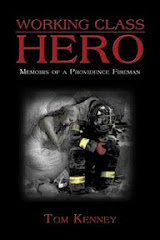Paul Follett: Underworked firefighters become whiners
01:00 AM EST on Wednesday, January 19, 2011
The basic problem that firefighters face, which gets little attention, is that through no fault of their own, firefighters suffer from boredom; 10 percent of the time there are not enough firefighters to handle the task at hand, but the other 90 percent of the time there is too little to do.
Consequently, they have too much time on their hands between the peak demands, too much nonproductive time; they can only train and polish equipment so much. The circumstances allow too much time to dwell on such things as their pensions and commiserating with their fellows on firehouse politics or on how the public does not appreciate their sacrifices or what the next meal will be.
Firefighters joined the force as spirited, young, very able folks and over time, the job boredom grinds many of them down into shells of their original selves and creates enclaves of whiners. Given the firefighters’good job benefits, they get locked in and economically unwilling to consider leaving the force to escape the boredom before they are pension-eligible.
My suggestion is to broaden the scope of their jobs, and make their jobs more interesting by making firefighters public safety officers.
With today’s communications technology there is no need for all firefighters to hang around at the station. These are capable people who, I am sure, could be crossed-trained for a broader public-safety role. They could be patrolling the streets, working in schools or participating in other safety functions while still being on call for fast response to fire or other emergencies.
The fire stations would be manned by a minimal, rotating staff of sufficient number only to get equipment to the emergency site. I would also suggest that the police force could be crossed-trained in firefighting — not necessarily as experts but able to accomplish the basic tasks. I suggest that the outcome would be more fulfilling with less boredom and improvement in public safety. Such a program could be started on a voluntary basis.
Paul Follett Wakefield
Tom Kenney: Follett’s drivel about firefighters
01:00 AM EST on Thursday, January 20, 2011
I couldn’t allow the letter-to-the-editor “Paul Follett: Underworked firefighters become whiners” go without rebuttal. ProJo’s editors have truly sunk to a new low by allowing such drivel to be printed.
Mr. Follett can take his cleverly-worded back-handed compliments to firefighters, “These are capable people who, I am sure, could be crossed-trained for a broader public-safety role” and go play with the lives and careers of someone else. He knows nothing about the job of firefighter. He makes many assumptions in his letter that are simply not true.
“…firefighters suffer from boredom; 10 percent of the time there are not enough firefighters to handle the task at hand, but the other 90 percent of the time there is too little to do.” Firefighters, despite what this man thinks, are not bored. He is right that about 10 percent of the time there are too few firefighters to do the task at hand, but his assertion that 90 percent of the time there is too little to do is ridiculous. Consequently all his conclusions from that point on are baseless.
He continually shows in his letter that he knows nothing about the importance of response time to an emergency. Response times, for the first-in fire company and for the entire first alarm assignment, are important criteria for determining the fire insurance rating of a municipality. Besides being an economic factor on their own, these rates show the effectiveness of a fire department to adequately protect the citizens of the city or town. These figures, minimum staffing levels and maximum response times, are not arbitrary numbers. They represent the real life factors to be considered when attempting to ascertain whether or not a fire department can reach the scene of a fire and stretch a hoseline into the building fast enough to save the life of a victim inside.
This cannot be done by having the on-duty firefighters separated in different areas of their districts doing different things. The company needs to respond together in the most efficient and expeditious manner possible – there’s a reason we have sirens on the trucks. Only by a quick response do we have a chance to make a save at a rapidly expanding fire. Mr. Follett’s ideas would be fine for a brush fire but not for a structure fire in an occupied building. These types of fires happen much more often than the general public is aware. Most do not make the news.
While it may be his uneducated opinion that “Firefighters joined the force as spirited, young, very able folks and over time, the job boredom grinds many of them down into shells of their original selves and creates enclaves of whiners,” it is far from the truth. Firefighters everywhere, rightfully, are insulted by this type of characterization. This is simply hateful propaganda on his part, with absolutely no basis in fact. We are not attempting to portray ourselves as super-heroes by any means, but we do put ourselves in harm’s way in order to protect our citizens and their property. It is a slap in the face to each of us that we have been talked about in this way the media (including ProJo) and uninformed citizens such as Mr. Follett.
Tom Kenney
Subscribe to:
Post Comments (Atom)


No comments:
Post a Comment